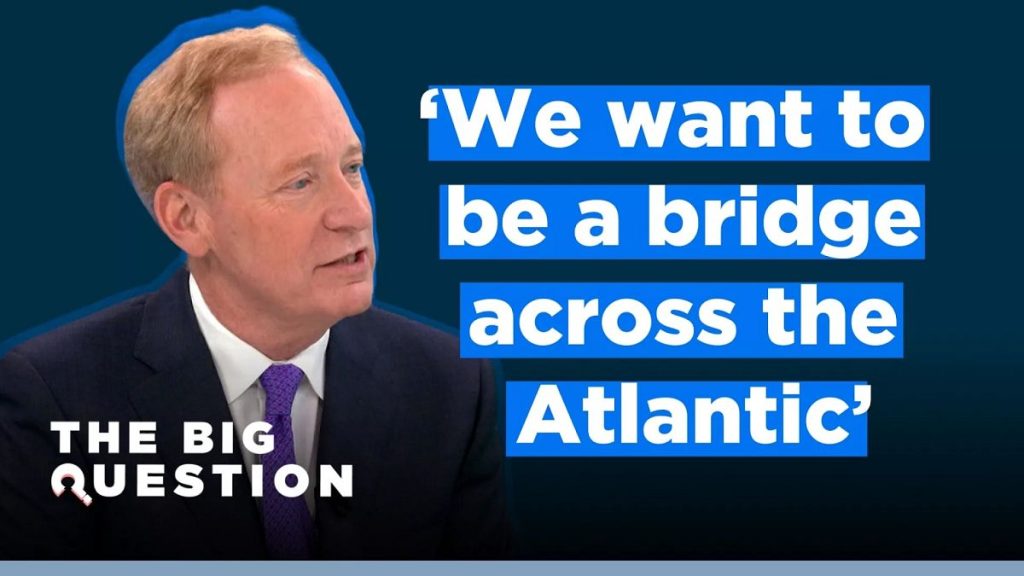On April 30, Microsoft unveiled its New European Digital Commitments in a significant address given by company president Brad Smith in Brussels. This initiative, aimed at bolstering Europe’s digital landscape, includes plans to enhance AI and cloud ecosystems, ensure digital resilience amid geopolitical challenges, and boost economic competitiveness across the continent. As Europe grapples with various geopolitical tensions, the involvement of an American tech giant raises questions about the appropriateness and impact of such partnerships on the European digital economy.
| Article Subheadings |
|---|
| 1) First Steps Towards an AI Economy |
| 2) Microsoft’s Commitment to European Presence |
| 3) Legal Protections for Data Security |
| 4) Adaptability Amid Geopolitical Tensions |
| 5) Future Prospects for European Tech |
First Steps Towards an AI Economy
In his address, Brad Smith articulated Microsoft’s vision of fostering an AI-driven economy, explaining that the company is committed to providing technology that supports both individuals and organizations in achieving success. The commitments extend beyond mere technological support, aiming to stimulate the growth of AI and cloud infrastructures across Europe. Microsoft has pledged to enhance its European data center capacity by an impressive 40% within the next two years, which will ultimately result in over 200 operational data centers across 16 countries. This initiative is expected to yield not only immediate job opportunities but also a “multiplier effect” on economic growth, creating wider benefits for businesses and communities.
Microsoft’s Commitment to European Presence
While Microsoft’s investments are anticipated to significantly enhance Europe’s economic competitiveness, they also signify the company’s ongoing dedication to maintaining a strong presence in the region despite shifting geopolitical climates. According to Brad Smith, the success of Microsoft is intertwined with its historical and continuing engagement in Europe. He stated, “I don’t think Microsoft would be the global success it is today without our longstanding presence in Europe,” highlighting that approximately one-quarter of Microsoft’s global business derives from this region. This enduring relationship demonstrates that mutual benefits can be derived from this partnership, as both parties stand to gain from enhanced technological capabilities and economic growth.
Legal Protections for Data Security
Amid concerns over data security and potential geopolitical strife, Microsoft has taken proactive measures to fortify its legal standing in Europe. The company has added specific clauses to its agreements with European governments and the European Commission, pledging to legally contest any attempts to halt its operations in the region. Brad Smith expressed confidence in their ability to prevail in court if such challenges arise and elaborated on contingency plans if they were unsuccessful: “We’ll have a backup group of suppliers and partners here in Europe who’ll have our code stored in secure repositories.” This commitment is designed to alleviate fears regarding EU data security, especially as tensions between the U.S. and Europe continue to rise amidst discussions about privacy and sovereignty.
Adaptability Amid Geopolitical Tensions
As geopolitical tensions escalate, particularly in the context of possible trade disputes between Europe and the United States, Brad Smith assured stakeholders that Microsoft is fully prepared to navigate these challenges. “We will take whatever comes, and we’ll help our customers adapt,” he stated, underscoring the company’s commitment to being a stabilizing force in these uncertain times. He advocates for maintaining strong transatlantic ties and emphasizes that the historical relationship between Europe and the U.S. must be preserved, especially in business. His remarks indicate a desire for collaboration rather than conflict, urging all parties involved to engage in dialogue to resolve issues that may arise.
Future Prospects for European Tech
Looking ahead, the implications of Microsoft’s commitments extend far beyond immediate operational enhancements. Brad Smith envisions that the ongoing development of AI technologies will fundamentally reshape the business landscape, emphasizing that AI will be integral to virtually all sectors, encompassing government, non-profits, and enterprises alike. He asserts that these advancements will serve as catalysts for innovation and economic growth across Europe, underlining their potential role in creating a thriving digital ecosystem. With Microsoft’s pledges in place, there is palpable optimism regarding the future trajectory of the tech landscape in Europe, as stakeholders prepare for the arrival of a new era marked by digital transformation.
| No. | Key Points |
|---|---|
| 1 | Microsoft’s commitments aim to strengthen Europe’s digital economy through enhanced AI and cloud infrastructure. |
| 2 | The company plans to increase data center capacity in Europe by 40% within the next two years, creating job opportunities. |
| 3 | Legal provisions are in place to contest any forced operational halts, ensuring European data protection. |
| 4 | Microsoft is committed to adapting to geopolitical challenges while advocating for stronger transatlantic ties. |
| 5 | The long-term vision includes integrating AI into all sectors, fostering innovation and economic growth in Europe. |
Summary
As Microsoft lays out its New European Digital Commitments, the implications for Europe’s digital economy are significant. By investing heavily in AI and cloud technologies, the company aims to bolster economic competitiveness and resilience amidst geopolitical uncertainties. The initiatives reflect a commitment not only to technological development but also to ensuring data security and legal compliance in the face of evolving challenges. The partnership between an American tech giant and European markets sets the stage for a new era of digital transformation, benefitting both parties involved.
Frequently Asked Questions
Question: What are Microsoft’s New European Digital Commitments?
The commitments include pledges to enhance AI and cloud infrastructures in Europe, increase data center capacity by 40%, and improve digital resilience amidst geopolitical challenges.
Question: Why is Microsoft expanding its data center capacity in Europe?
The expansion is intended to support growing demand for cloud services and AI technologies, which are vital for strengthening Europe’s digital economy and providing job opportunities.
Question: How will Microsoft ensure data security in Europe?
Microsoft has introduced legal measures to contest any attempts to suspend operations in Europe and has established contingency plans for data security, including secure repositories for code storage.


